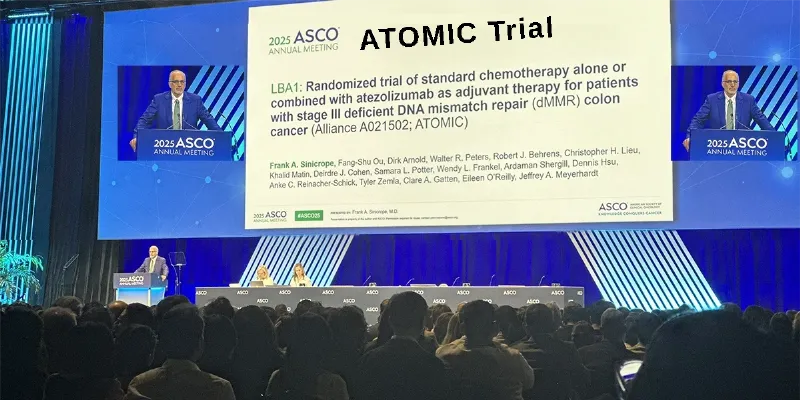Adding atezolizumab to FOLFOX chemotherapy after surgery boosts disease-free survival in patients with surgically resected mismatch repair deficient stage III colon cancer
Adding atezolizumab to FOLFOX chemotherapy after surgery boosts disease-free survival in patients with surgically resected mismatch repair deficient stage III colon cancer

Recent data from the ATOMIC (A021502) Phase III trial mark an important advancement for treating colon cancer in patients with mismatch repair deficient (dMMR) tumours. Researchers have found that combining the immune checkpoint inhibitor atezolizumab with standard FOLFOX chemotherapy after surgery significantly improves disease-free survival compared to chemotherapy alone.
The study enrolled patients who had undergone surgical resection for stage III colon cancer and whose tumours showed deficient mismatch repair, a biomarker associated with better response to immunotherapy. Participants were randomly assigned to receive either adjuvant FOLFOX chemotherapy alone or FOLFOX plus atezolizumab.
Improved Disease-Free Survival and Risk Reduction
The ATOMIC trial achieved its primary endpoint. Patients receiving the combination of atezolizumab and FOLFOX showed a statistically significant improvement in disease-free survival. The risk of recurrence or death was meaningfully lower compared with those treated with chemotherapy alone. These results suggest that combining immunotherapy with adjuvant chemotherapy in this patient subgroup can lead to more durable remissions.
Beyond just delaying recurrence, the combination therapy also appeared to extend the period during which patients remained free of disease symptoms and additional treatment, a key concern after surgery. While full overall survival data are not yet mature, the magnitude of improvement in disease-free survival is compelling enough that oncologists are considering whether this approach might be adopted into clinical practice.
Implications for Treatment, and What To Watch Next
The findings have several practical implications. First, mismatch repair status (dMMR) becomes again clearly central in deciding adjuvant treatment in colon cancer. Testing for dMMR or microsatellite instability (MSI) should be routine in stage III disease to help identify patients who may benefit from the addition of immunotherapy.
Second, the tolerability of the regimen seems acceptable. While combining atezolizumab with FOLFOX adds immune-related risks, those were manageable in the trial setting. Most patients were able to complete therapy without unexpected safety concerns.
Looking ahead, further follow up will be needed to assess whether this improvement in disease-free survival translates into gains in overall survival, and whether certain subgroups (for example, based on age, tumour burden, or nodal involvement) get more benefit than others. Also important will be real-world applicability: how patients outside of clinical trials respond, and whether health systems can accommodate the added cost and monitoring demands of immunotherapy in the adjuvant setting.
Keep in touch with our news & offers